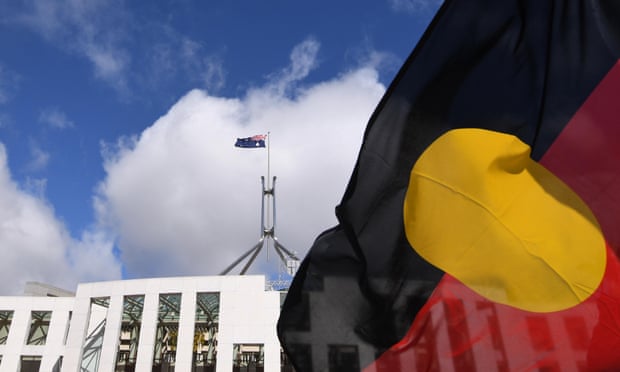For as long as many of us can remember, we’ve had harrowing reports, deep investigations and crisis meetings into the fierce injustice of Indigenous inequality.
The torment of powerlessness, as the Uluru statement so eloquently put it, was that Indigenous Australians were deprived the agency to turn this horrific tide.
We know too, unlike many other nations from similar historical circumstances, Australia is yet to fully reckon with the intergenerational consequences of the dispossession and discrimination inflicted against Aboriginal and Torres Strait Islander people.
From where we sit, it is no longer good enough in 2023 to frown at this problem: we need to move the dial.
The voice is an elegant, practical and conservative step toward incorporating community-level evidence into policymaking.
Sign up for Guardian Australia’s free morning and afternoon email newsletters for your daily news roundup
For us, voting yes is a liberal act to solve this. Liberal leaders, from the trailblazing Ken Wyatt to the intellectually brilliant Julian Leeser, have been shaping and refining it for many years.
There are many Liberals and former Liberals who know in their heart the burning desire to do better, to be better and to walk with Aboriginal and Torres Strait Islander Australians toward a future that rights the wrongs of the past in a practical and proportionate way.
It is consistent with our commitment to liberalism because it empowers families and communities coming together to take responsibility for their lives. It is an opportunity to stand as Australians who put country first and party second.
But it is only now – as it becomes clear Australians are open to a new way of addressing the burning injustices against Indigenous people – that we hear dishonest claims which ignore not only fact, but also electoral realities.
What is the Indigenous voice to parliament and how would it work?
Show
What has happened already?
The Albanese government has put forward the referendum question: "A Proposed Law: to alter the Constitution to recognise the First Peoples of Australia by establishing an Aboriginal and Torres Strait Islander Voice. Do you approve this proposed alteration?"
The PM also suggested three sentences be added to the constitution:
- There shall be a body, to be called the Aboriginal and Torres Strait Islander Voice.
- The Aboriginal and Torres Strait Islander Voice may make representations to the Parliament and the Executive Government of the Commonwealth on matters relating to Aboriginal and Torres Strait Islander peoples;
- The Parliament shall, subject to this Constitution, have power to make laws with respect to matters relating to the Aboriginal and Torres Strait Islander Voice, including its composition, functions, powers and procedures.
How would it work?
The voice would be able to make recommendations to the Australian parliament and government on matters relating to the social, spiritual and economic wellbeing of Aboriginal and Torres Strait Islander people.
The voice would be able to table formal advice in parliament and a parliamentary committee would consider that advice. But all elements would be non-justiciable, meaning that there could not be a court challenge and no law could be invalidated based on this consultation.
How would it be structured?
The Indigenous voice co-design report recommended the national voice have 24 members, encompassing two from each state, the Northern Territory, ACT and Torres Strait. A further five members would represent remote areas and an additional member would represent Torres Strait Islanders living on the mainland.
Members would serve four-year terms, with half the membership determined every two years.
Photograph: Lukas Coch/AAP
It was dishonest to claim that the national apology to the stolen generations would lead to a wave of litigation, and today it is deeply cynical to claim the voice will lead to an inundation of litigation against defence contracts, interdepartmental committee decisions and technology contracts.
It is deeply devoid of pragmatism to reheat a policy rejected at a federal election and present it as a credible alternative.
after newsletter promotion
And, perhaps most tellingly, it is ignorant of the mateship that defines Australians to assume that cynical American campaign strategies will work when they have consistently failed previously.
We fear the recent decision by the Liberal party to bind itself to a no case is shortsighted and detrimental to the long-term interests of the nation.
From Australia’s ancient beginning, the lessons taught by our land have been to value honesty, pragmatism and mateship. Unlike so many, our country has stood stable and grown prosperous thanks to them. They also hold the key to our future as we work to win a referendum that can make right an unjust past.
Building a nation takes many small acts of courage, of conviction and of sincerity.
We, and many Liberals, intend to rise to the occasion. We invite you to join us.
Bridget Archer is the federal member for Bass. Dr Fiona Martin is a psychologist and former federal member of Reid

 1 year ago
55
1 year ago
55










 English (US)
English (US)